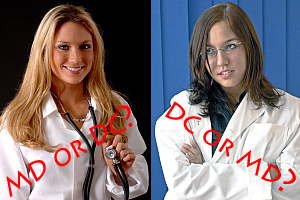It’s important to know the basic differences between an MD (Medical Doctor) and a DC (Doctor of Chiropractic) so that you understand the unique role that each type of medical professional plays in helping you to maintain or regain your health.
MDs and DCs are both licensed healthcare providers. They examine, diagnose and treat patients. However, most MDs have more hours of training in physiology, whereas DCs typically have more hours of anatomy training. Their methods of practice may help explain this difference in emphasis. DCs are experts in musculoskeletal health and general wellness. Like an MD, a DC will use diagnostic imaging, lab tests, clinical exams and questionnaires to determine a diagnosis, but the course of treatment will be different. MDs tend to prescribe pharmaceuticals and surgery to treat patients, whereas DCs use a more holistic approach involving a variety of hands-on treatments as well as advice on diet and exercise.
Office visits are also often quite different experiences. On a typical visit to an MD, you will likely be asked by a nurse or assistant to fill out paperwork and provide information about your condition. Then the MD will visit you, look at the information, perhaps perform a brief clinical examination, and quickly prescribe a treatment. In the course of doing this, most doctors will take only a small amount of time to understand your overall health picture. And treatment will usually involve drugs and/or medical procedures.
It is not uncommon for patients to have a more personal relationship with their DC than with their MD. Visits to a DC also tend to be more involved. The chiropractor will speak with you at length about not only your physical symptoms, but your lifestyle habits as well. He or she will examine you, perform any necessary tests, discuss possible treatment options, and provide appropriate manual therapies. Together, these treatment methods are sometimes referred to as “physical medicine”. These may include targeted spinal adjustments, therapeutic massage, disc decompression, laser therapy, electrical stimulation and hot and cold treatments as well as structured exercise and stretching programs. In addition, the chiropractor may also make specific suggestions about your nutrition, day-to-day environment and physical activity.
In general, musculoskeletal problems (particularly those related to back, neck and joint pain) are better treated by a DC. However, many chiropractors have also developed specialized expertise in other areas as well. DCs will refer you to an MD if they believe that diagnosing and treating your specific condition is beyond their scope of practice.

